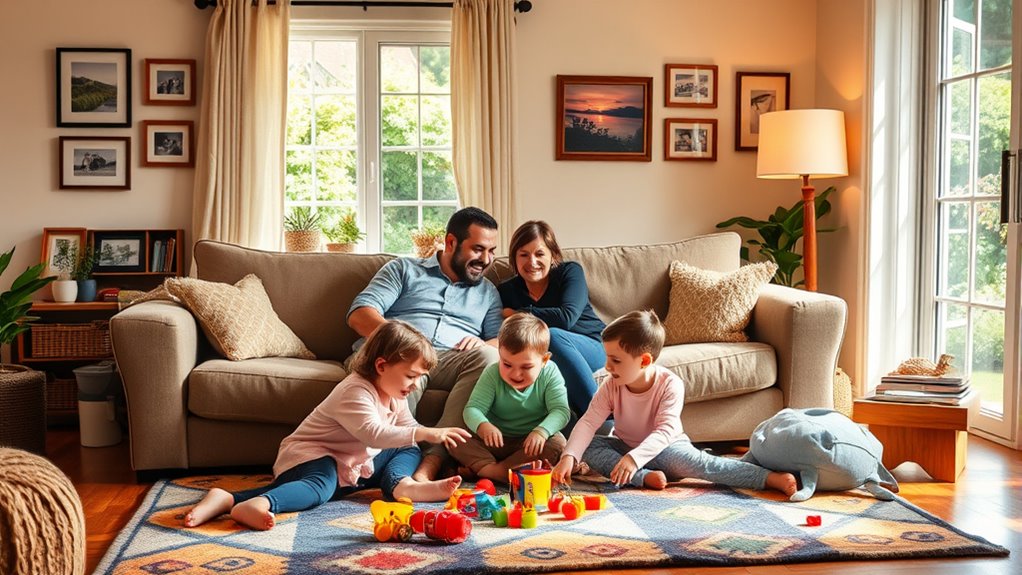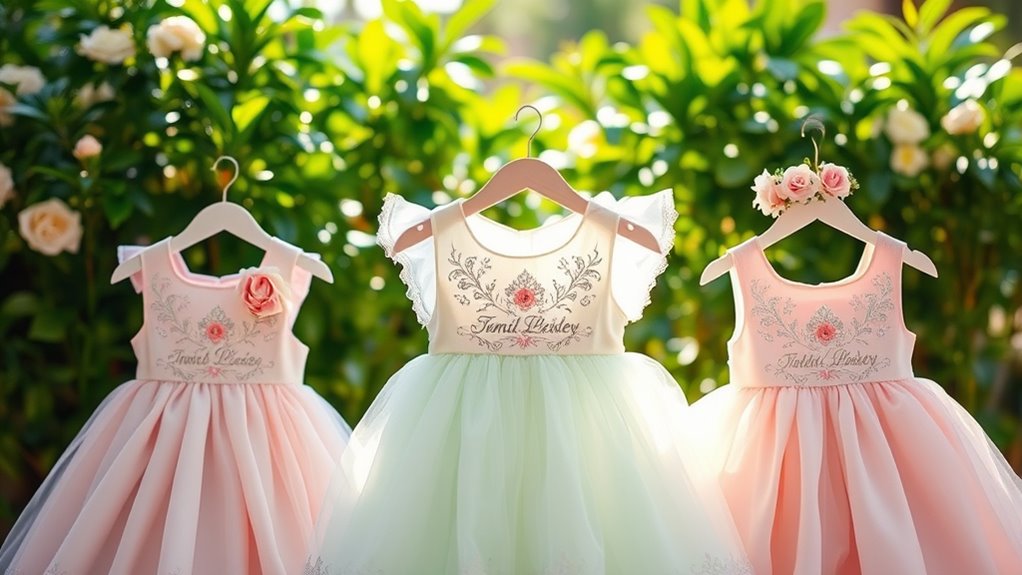
When you consider the advantages of a nuclear family, you might notice the closer bonds that form among its members. This structure fosters a nurturing environment where parents can focus on their children’s growth. You also gain greater independence and flexibility in decision-making. These benefits can lead to improved communication and financial stability. But how do these elements truly shape family dynamics in today’s world? Let’s explore further.
Key Takeaways
- Nuclear families foster closer bonds through shared experiences and emotional support, strengthening relationships among members.
- Parents can focus more on children’s needs, enhancing emotional security and individual contributions to family life.
- Greater independence allows family members to explore personal aspirations without pressure from extended family.
- Quick decision-making processes lead to efficient resolutions and stronger connections among family members.
- Consistent routines provide stability and facilitate easier adaptation to changes, promoting resilience and unity within the family.
Closer Family Bonds

When you think about family dynamics, it’s clear that living in a nuclear family often fosters closer bonds among its members. In a nuclear setup, you typically share daily experiences, which helps strengthen your relationships. You create unique family traditions, whether it’s celebrating holidays or having weekly game nights, and these rituals reinforce your emotional connections. You know you can rely on each other for emotional support during tough times, which builds trust and resilience. This close-knit environment allows for open communication, where you feel comfortable expressing your thoughts and feelings. Overall, the intimacy of a nuclear family cultivates a sense of belonging, making it easier to navigate life’s challenges together.
Enhanced Parenting Focus

In a nuclear family, parents often find it easier to focus on their children’s needs and development. With dedicated attention, you can explore various parenting styles that suit your child’s personality and learning pace. This concentrated effort helps foster emotional security and strengthens parent-child bonds.
| Parenting Style | Focused Attention Benefits | Emotional Impact |
|---|---|---|
| Authoritative | Encourages open communication | Builds trust and respect |
| Authoritarian | Instills discipline | Creates fear or anxiety |
| Permissive | Nurtures creativity | May lead to confusion |
| Uninvolved | Lacks guidance | Risks emotional neglect |
| Balanced | Supports independence | Fosters self-esteem |
Greater Independence

In a nuclear family, you often enjoy greater independence when it comes to personal decision-making. This setup allows you to explore life choices without the influence of extended family pressures. As a result, you can create a lifestyle that truly reflects your values and aspirations.
Personal Decision-Making Freedom
While living in a nuclear family provides a supportive environment, it also grants you a level of personal decision-making freedom that is often hard to find in larger family structures. This independence allows you to pursue your individual aspirations without the constant influence of extended family. You can make choices that align with your values and goals, fostering personal growth in ways that feel authentic to you. Whether it’s choosing a career path, deciding how to spend your free time, or even where to live, the autonomy you experience in a nuclear family encourages you to explore and develop your identity. Embracing this freedom can lead to a more fulfilling life, tailored to your unique desires and ambitions.
Enhanced Life Choices
Living in a nuclear family not only fosters personal decision-making freedom but also enhances your life choices, providing greater independence. Within this structure, you have the space to pursue your individual aspirations without the constraints often found in extended families. You can make lifestyle choices that truly reflect who you are, whether it’s your career path, hobbies, or relationships. This independence encourages personal growth and helps you develop a strong sense of identity. You’re free to explore new interests and adapt your life according to your values. Ultimately, the nuclear family environment supports your journey toward self-discovery, enabling you to create a fulfilling life that aligns with your dreams and ambitions.
Flexibility in Decision-Making

In a nuclear family, you can quickly reach a consensus on decisions that matter most to you. This flexibility allows you to tailor family dynamics to fit your unique needs and preferences. Whether it’s planning a vacation or adjusting daily routines, the ease of decision-making promotes harmony at home.
Quick Consensus Building
When a family operates as a nuclear unit, it often enjoys quicker consensus building, allowing for more efficient decision-making. Since there are fewer members involved, you can resolve conflicts more swiftly and achieve group consensus. This streamlined process enhances family dynamics and fosters unity. Here are some benefits of quick consensus building:
- Faster decisions: You can make choices without lengthy discussions.
- Reduced conflict: With fewer opinions, disagreements are easier to manage.
- Stronger connections: Collaborating on decisions strengthens your bond.
- Increased adaptability: Your family can adjust to changes smoothly.
In a nuclear family, these advantages create a harmonious environment, making it easier to navigate life’s challenges together.
Tailored Family Dynamics
While maneuvering family life, having a nuclear structure allows you to tailor your dynamics to fit your unique needs. You can create tailored relationships that foster open communication and understanding. With fewer family members, decision-making becomes smoother, enabling you to focus on what truly matters to each person involved. You and your partner can provide individualized support to your children, addressing their specific emotional and educational requirements. This flexibility means you can adapt your parenting techniques and family routines as needed, ensuring that everyone feels valued and heard. By cultivating this environment, you strengthen bonds and promote a sense of belonging, making it easier for your family to thrive in an ever-changing world.
Improved Communication

Effective communication thrives in a nuclear family setting, as close-knit relationships foster open dialogue. You’ll find that living together encourages active listening and enhances conflict resolution skills among family members. This environment allows everyone to express their thoughts and feelings freely, which strengthens bonds and promotes understanding.
Consider these key benefits of improved communication:
- Better understanding of each other’s needs and emotions
- Enhanced problem-solving capabilities during disagreements
- Increased emotional support, leading to stronger family ties
- Developed trust, making it easier to share personal experiences
In this supportive atmosphere, you can navigate challenges more effectively, ensuring that everyone feels heard and valued. This ultimately leads to a harmonious family life.
Financial Benefits

Strong communication in a nuclear family can also lead to significant financial benefits. When everyone’s on the same page, you can effectively collaborate on budget management. By discussing expenses and savings openly, you’ll better understand your family’s financial needs and priorities. This shared approach to financial planning helps you set realistic goals and allocate resources wisely.
Moreover, you can identify areas where you can cut unnecessary costs together. With everyone involved, you’re more likely to stay committed to the budget, making it easier to reach financial milestones. Plus, pooling resources can provide a safety net during tough times. Ultimately, strong financial planning within a nuclear family fosters stability and security, allowing you to thrive as a unit.
Simplified Household Dynamics

One major advantage of a nuclear family is the simplified household dynamics that come from fewer members living under one roof. With a smaller family unit, you can establish clear household roles and maintain consistent family routines. This clarity helps everyone understand their responsibilities and fosters a harmonious environment.
A nuclear family simplifies household dynamics, fostering clear roles and harmonious routines for a more enjoyable daily life.
Here are some key benefits of this simplified structure:
- Defined Responsibilities: Each member knows their role, reducing conflicts.
- Streamlined Communication: Fewer people lead to easier discussions and decision-making.
- Consistent Routines: Family schedules become more predictable, enhancing stability.
- Stronger Bonds: With everyone engaged, you can build deeper connections.
In short, a nuclear family allows for more manageable dynamics, making daily life smoother and more enjoyable.
Easier Adaptation to Change

With streamlined household dynamics, nuclear families often find it easier to adapt to change. You and your immediate family members can quickly implement adaptation strategies, allowing for a more efficient response to new circumstances. Whether it’s relocating for a job or adjusting to a new school, your smaller family unit can communicate openly and make decisions rapidly. This agility fosters family resilience, as you learn to navigate challenges together. You’ll discover that working as a tight-knit group helps strengthen bonds and promotes emotional support. In the end, facing change as a nuclear family not only eases the shift but also reinforces your ability to tackle future obstacles with confidence and unity.




